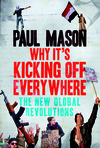-

The soul of inequality in American life
"While America has no legitimate public language for discussing class inequality, it does have a hypnotic substitute: racecraft." -

Theodore Allen's The Invention of the White Race
"A monumental study of the birth of racism in the American South." -David Roediger
Authors
-

Jodi Dean
"Jodi’s sharp analysis of the impasses of the left is also a kind of requiem for much of the 2.0 bluster of the last decade."—Mark Fisher, -

Jacques Rancière
"One of our most stimulating thinkers"—<em>Paris Match</em> -

Ariella Azoulay
"The most compelling theorist of photography writing today."—Jonathan Crary
-

Slavoj Žižek
"The situation is catastrophic, but not serious." -

Claire Bishop
"Artificial Hells combines vast historical knowledge with a precise analysis of individual artistic practices."—Boris Groys -

Alain Badiou
“Tunisia, Egypt: the Eastern wind shakes the arrogance of the West.”
Events
-

October 25, 2012
Brooklyn, NY
Brooklyn Museum
Karen Fields, Barbara Fields, and Adolph Reed in Conversation at the Brooklyn Museum
Blog
-
Tony Blair in Two-Faced Turnaround Shocker!
Too many employers have convinced themselves that experience, plus a few quid for a sandwich and the bus fare, is an acceptable form of payment – we just never expected one of those employers to be the man who introduced the minimum wage law.
So says Tanya de Grunwald, founder of Graduate Fog, about recent revelations that Tony Blair has been staffing his offices with unpaid interns. According to the Guardian, one candidate for Blair's office had a 90-minute test before being told he was unsuitable because he was only able to commit to four days of unpaid work.
Verso author Ross Perlin was keen to draw attention to the fact that "experience" and "exploitation" seem to have the same meaning today with his book Intern Nation. In the wake of Perlin's book there has been a steady restructuring of internship rights and wages i.e. they appear to actually exist now. But the fact that former Prime Minister Tony Blair, who is reported to make an annual income of £20m and who draws a public allowance and prime ministerial pension would not enforce his own wage legislation will probably not surprise everyone.
A spokesperson from HMRC has stated that they "always act on allegations of NMW abuse", while a statement from Tony Blair's office has said they value their interns "very highly".
I'm sure they do.
Visit the Guardian to read the article in full.
-
"It's time to win more than arguments" - The Revenge of History reviewed in the Guardian, Al Jazeera and the HuffPost
The heat of debate within Seumas Milne's The Revenge of History is stirring up further discussion in its reviews. Featured in Al Jazeera, the HuffPost and in the Guardian - reviewed by Verso's Owen Hatherley - Milne's collection of Guardian columns from 1997 to 2012 is a timely work of vengeful revisionism.
David Wearing, writing for Al Jazeera, marks out the trajectory of Milne's argument: that the neo-conservative "empire" in the years after the fall of the Berlin Wall realistically only lasted for seven years. While the neo-liberals went head first into a future they believed to be theirs, the voices of the Left continued to speak of the potential for disaster, but when times are good, the voices of dissent are silenced even more than usual due to sheer unpopularity. The same is the case for Milne's prediction of greater resistance in Iraq post-Saddam Hussein. The Revenge of History proves that the "Cassandras have been vindicated, but this is worthless by itself, of benefit only to our own egos".
Wearing sees the necessity of Milne's work being specifically a collection of columns: the advice we didn't take was there all along and now that we're actually paying attention, what are we going to do?
-
'Long Live the Dialectic', Long Live the Nothing
Steven Connor, in the Times Literary Supplement, sums up the major importance of Slavoj Žižek's ''everlasting gobstopper of a book" Less Than Nothing. In a single paragraph, Connor explains Hegel's Phenomenology of Spirit as the 'engorgement' of Spirit through the dialectical movement of history (spirit meets its negative antagonist in the form of matter or the material world and responds by both preserving and overcoming both thesis and antithesis through the process of sublation), the principle of the postmodernist reaction to it (denouncing the Hegelian dialectic as one of several totalising conceptions of the world that it rejects) and finally Žižek's critical thrust that manages to:
both discredit postmodernist arguments in their dependence on a dishing of Hegel, and to endorse the objections to totality that are key to those postmodernist arguments.
-
Žižek is a cool guy who doesn’t look at explosions

Why? It’s ideology, stupid. After his 1,200-page Lacanese-Hegelian philosophical treatise, Žižek has returned to his other prism—popular culture. The Pervert’s Guide to Ideology, Director Sophie Fiennes new film with Žižek, premiered at the 56th BFI London Film Festival next week to a packed cinema. As I watched the 90-minute cinematic remix of various twentieth-century films including Zabriski Point, The Sound of Music, They Live, The Titanic, Seconds, Taxi Driver and more, Zizek in his characteristically witty style, expliained his concept of ideology.
Discussions
-
I would hesitate to call the book magisterial/monumental whose author tells us (p.196) that the great musical stage actress Fritzl (sic) Massary was the daughter of (playwright) Carl Sternheim. One shudders to think what else he's got wrong. And the first name Massary was known by, was Fritzi, not Fritzl.
-
Who translated this book, and why is the translator's name omitted from the cover, from your description on this site, and from your promotional materials? Are you ashamed of his/her work?
-
....that we've had Nazis in the military off and on since WWII. The was a book written in 1943 called “Under Cover” by John Roy Carlson; you can get it on Scribd. In it, Carlson relates how he spied on natavist, fascist, and Nazi groups from the late 1930s until the book was published, and many of the goons he knew joined the Army in 1941 to both stop draft harassment by the government and to spread defeatism. During the Vietnam War era there were a small number of crypto-Nazis in the Army, one of the outspoken ones* was interviewed in the early 1970s documentary “The California Reich.” Finally, I can say that I've heard of skinheads and neo-Nazis being in the Army before September 11th; CBS News did a report on them during the late 1990s (1997 or 1999.) They had infiltrated the paratroops at Fort Bragg, and one of the Nazis had his girlfriend living illegally on base. In the past such soldiers have been drummed out either through court-martial or dishonorable discharge, but the last decade has seen the Army or the Marines hanging on to these clowns because they have no replacements, as Kennard points out.________________* That soldier, a sergeant, was being investigated by the Army during the making of the documentary. Carlson's Nazi soldiers were also discharged.





